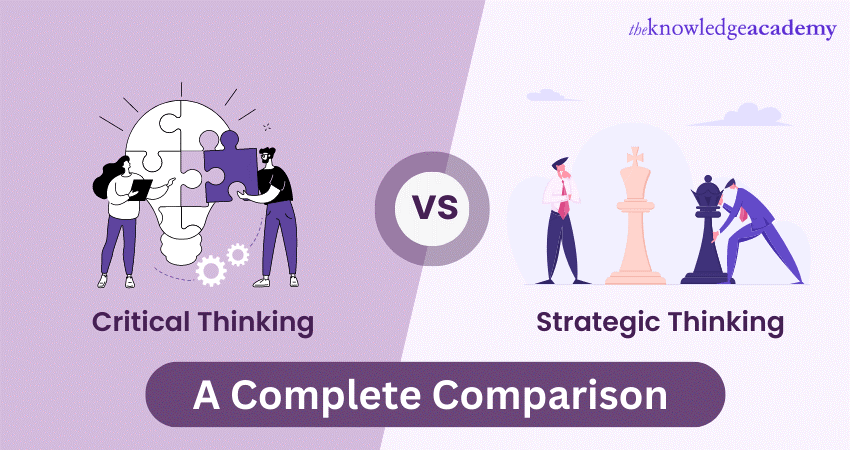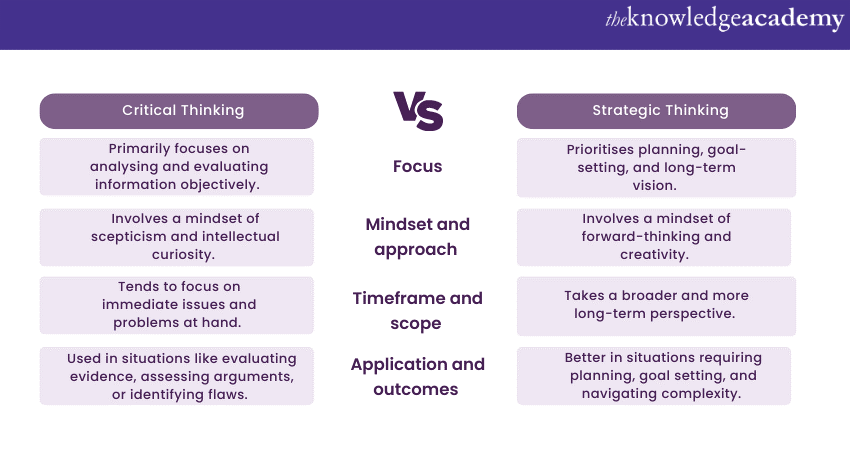We may not have the course you’re looking for. If you enquire or give us a call on +357 26030221 and speak to our training experts, we may still be able to help with your training requirements.
We ensure quality, budget-alignment, and timely delivery by our expert instructors.

Critical Thinking and Strategic Thinking are often used in planning, decision-making, and problem-solving. However, people often compare Critical Thinking vs Strategic Thinking to understand which is better.
In reality, both can complement each and be used together to get better outcomes. Want to know how? Read this blog to learn about the key differences between Critical Thinking vs Strategic Thinking. Also, understand how they can be used together to drive success.
Table of Contents
1) Understanding Critical Thinking and Strategic Thinking
a) What is Critical Thinking?
b) Exploring Strategic Thinking
2) Difference between Critical Thinking vs Strategic Thinking
a) Focus and emphasis
b) Mindset and approach
c) Timeframe and scope
d) Application and outcomes
3) Complementary nature of Critical Thinking and Strategic Thinking
4) Conclusion
Understanding Critical Thinking and Strategic Thinking
Before exploring the difference between the two and which is better, it is essential to understand both. Let's have a brief look at both the skills:
What is Critical Thinking?
Critical Thinking is a systematic and objective approach to analysing and evaluating information. It involves gathering evidence, questioning assumptions, and applying logical reasoning to form well-informed judgments. Key components of Critical Thinking include the following:
a) Information analysis: Gathering and examining information from various sources before forming opinions or making decisions.
b) Objective evaluation: Assessing evidence for reliability and validity, identifying biases, and detecting fallacies in arguments.
c) Problem-solving: Breaking down complex problems, considering alternative perspectives, and generating practical solutions.
By developing Critical Thinking skills, individuals become more effective problem solvers, make informed decisions, and achieve a broader understanding of the world.
Learn how to take strategic decisions. Register for our Strategic Planning And Thinking Training now!
Understanding Strategic Thinking
Strategic Thinking is a process that involves a proactive and forward-looking approach to planning, goal setting, and decision-making. It goes beyond immediate problem-solving and focuses on long-term implications, patterns, and connections. Strategic Thinking encompasses several key elements:
a) Planning and goal setting: Strategic Thinking emphasises the creation of a roadmap for achieving desired outcomes. It involves setting clear goals, defining strategies, and outlining steps to reach those objectives.
b) Vision and foresight: Strategic thinkers can envision future possibilities and anticipate challenges and opportunities. They consider long-term implications and trends to make decisions that align with the desired outcomes.
c) Pattern recognition: Strategic thinking focuses on identifying patterns, trends, and interrelationships among various factors. They can understand the underlying connections to get an overview of a situation.
d) Risk assessment and opportunity evaluation: Strategic Thinking involves assessing potential risks and rewards associated with different actions. It allows individuals to make calculated decisions by weighing the potential benefits against potential drawbacks.
Strategic Thinking is particularly valuable in planning and navigating uncertain or complex situations. By adopting a strategic mindset, individuals can anticipate challenges, adapt to changing circumstances, and take advantage of emerging opportunities.
Difference between Critical Thinking vs Strategic Thinking
While both Critical Thinking and Strategic Thinking are valuable cognitive processes, they have distinct characteristics and goals that set them apart. Understanding these differences can help individuals leverage the strengths of each approach in different situations. Let's explore the key difference between Critical Thinking vs Strategic Thinking:

Focus and emphasis
Critical Thinking primarily focuses on analysing and evaluating information objectively. Its main emphasis is on logical reasoning, evidence assessment, and identifying biases or fallacies in arguments. Critical Thinking ensures accuracy, clarity, and sound judgment in decision-making and problem-solving.
Strategic Thinking prioritises planning, goal-setting, and long-term vision. It looks beyond immediate analysis and focuses on understanding patterns, connections, and future implications. Strategic Thinking aims to align actions and decisions with long-term objectives and effectively navigate complex or uncertain environments.
Mindset and approach
Critical Thinking involves a mindset of scepticism and intellectual curiosity. It encourages individuals to question assumptions, challenge conventional wisdom, and seek evidence-based conclusions. Moreover, Critical Thinking is more analytical and fact-based, aiming to uncover the truth and make well-reasoned judgments.
On the other hand, Strategic Thinking involves a mindset of forward-thinking and creativity. It encourages individuals to explore future possibilities, envision desired outcomes, and think holistically about the bigger picture. The Strategic Thinking approach is more visionary, seeking to develop plans and strategies that align with long-term goals and capitalise on emerging opportunities.
Learn how to build a to-do list and create time checks with our Time Management Training - Get better at managing time.
Timeframe and scope
Critical Thinking tends to focus on immediate issues and problems at hand. It involves analysing a situation in detail, gathering relevant information, and evaluating it objectively. Additionally, Critical Thinking is crucial for making informed decisions in real time and solving specific problems effectively.
In contrast, Strategic Thinking takes a broader and more long-term perspective. It considers the larger context, trends, and potential future scenarios. Considering these factors allows for assessing risks, anticipating challenges, and developing plans encompassing multiple aspects of a situation. Strategic Thinking also provides a roadmap for achieving long-term objectives and navigating complex environments.
Application and outcomes
Critical Thinking is highly valuable in situations that require objective analysis, such as evaluating evidence, assessing arguments, or identifying flaws in reasoning. It is crucial for making informed decisions based on facts and evidence, especially in scientific research, critical analysis, or logical problem-solving.
On the other hand, Strategic Thinking is advantageous in situations requiring planning, goal setting, and navigating complexity. It helps develop a strategic vision, identify opportunities, mitigate risks, and make decisions that align with long-term objectives.

Complementary nature of Critical Thinking and Strategic Thinking
Critical Thinking and Strategic Thinking are complementary approaches that enhance decision-making, problem-solving, and planning. While Critical Thinking provides a solid foundation of analysis, objectivity, and evidence evaluation, ensuring accuracy in strategic plans. Strategic Thinking adds creativity, foresight, and a long-term perspective, encouraging individuals to envision desired outcomes and adapt to changing circumstances.
By integrating Critical and Strategic Thinking, individuals balance short-term needs and long-term goals. They can analyse problems effectively and consider broader contexts. This combination fosters adaptability, agility, and robust, well-informed and forward-thinking decision-making.
Conclusion
While there are some fundamental differences between Critical Thinking vs Strategic Thinking, both are valuable thinking styles that can be developed and applied to improve decisions and solve problems. So, embrace the power of Strategic & Critical Thinking in your process and lead yourself to success.
Develop your business and personal skills with our Personal Development Training and set yourself up for success.
Upcoming Business Skills Resources Batches & Dates
Date
 Time Management Training
Time Management Training
Fri 14th Mar 2025
Fri 9th May 2025
Fri 11th Jul 2025
Fri 12th Sep 2025
Fri 14th Nov 2025






 Top Rated Course
Top Rated Course


 If you wish to make any changes to your course, please
If you wish to make any changes to your course, please


